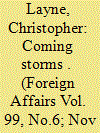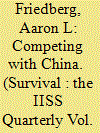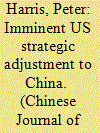|
|
|
Sort Order |
|
|
|
Items / Page
|
|
|
|
|
|
|
| Srl | Item |
| 1 |
ID:
175219


|
|
|
|
|
| Summary/Abstract |
Since the closing days of the Cold
War,U.S. policymakers, pundits,
international relations scholars, and
policy analysts have argued that greatpower war is a relic of a bygone age.
|
|
|
|
|
|
|
|
|
|
|
|
|
|
|
|
| 2 |
ID:
160138


|
|
|
|
|
| Summary/Abstract |
There appears to be a growing consensus in Washington, and in the capitals of many other advanced industrial democracies, that prevailing policies towards China have failed and that an alternative approach is now urgently required. In a recent, widely read article in Foreign Affairs, two former Obama-administration officials conclude that, after years of ‘hopeful thinking’ about China's future, the United States finds itself confronting ‘its most dynamic and formidable competitor in modern history’.1
1 Kurt M. Campbell and Ely Ratner, ‘The China Reckoning: How Beijing Defied American Expectations’, Foreign Affairs, March/April 2018, p. 70.
View all notes
Republican Senator Marco Rubio describes the challenge in similar terms, noting that in the 240 years since its founding, the United States has never before ‘faced an adversary of this scale, scope, and capacity’.2
2 ‘Worldwide Threats Briefing: 5 Takeaways, From Russia to China’, Wired, 13 February 2018, https://www.wired.com/story/worldwide-threats-briefing-russia-election-china/.
View all notes
‘Decades of optimism about China's rise have been discarded’, declares The Economist.3
3 ‘How the West Got China Wrong: Decades of Optimism About China's Rise Have Been Discarded’, The Economist, 1 March 2018.
View all notes
‘We got China wrong’, writes an editorialist for the Washington Post. ‘Now what?’4
|
|
|
|
|
|
|
|
|
|
|
|
|
|
|
|
| 3 |
ID:
185573


|
|
|
|
|
| Summary/Abstract |
As the Sino-American Great Power competition continues to intensify, newly-elected US President Joe Biden's administration now seeks to enlist the support of its allies and partners around the world. As Europe's largest economy and a, if not the, leading voice within the European Union, Germany represents an important puzzle-piece for Biden. But Germany, at least under outgoing chancellor Angela Merkel, has been reluctant to take sides. It is against this backdrop that this article looks into Germany's past and present trilateral relationships with the US and China through the theoretical lens of the so-called strategic triangle approach. Applying this approach, the article seeks to trace and explain German behaviour, as well as to elucidate the opportunities and pitfalls that have come with it. The article demonstrates that Germany's recently gained position as a ‘pivot’ (two positive bilateral relationships) between the US and Chinese ‘wings’ (positive bilateral relations with Germany and negative bilateral relations with each other) is desirable from the perspective of the strategic triangle. At the same time, being pivot is also challenging and hard to maintain. Alternative options, such as entering a US–German ‘marriage’ directed against China, are also problematic. The article therefore concludes that Germany has tough decisions to take going forward.
|
|
|
|
|
|
|
|
|
|
|
|
|
|
|
|
| 4 |
ID:
140822


|
|
|
|
|
| Summary/Abstract |
How can leaders in the United States and China ensure that future relations between their two countries are marked by peaceful cooperation and not conflict over the organization of world politics? Whereas most scholarly writing on the topic of China’s ‘peaceful rise’ has dwelt upon the ways and means by which Chinese leaders can steer their ship of state towards harmonious relations with the outside world, this article attempts to shift the focus onto foreign policy-making by the United States. The argument is that established states preside over a range of options when it comes to deciding how to respond to rising states during periods of shifting power and how they choose to adjust to an adverse alteration in relative power has dramatic consequences for the subsequent evolution of any given power-transitional dyad and, by extension, for the course of world politics more broadly. The author provides a conceptual framing of this function for established great powers during episodes of shifting power and seeks to elucidate in particular the domestic–political components of the role. The primary policy implication is to suggest that decision makers in the United States ought to be ready—much more ready than they currently are—to assume a hefty slice of responsibility for the ensuing power transition with China that most observers anticipate to be in the offing.
|
|
|
|
|
|
|
|
|
|
|
|
|
|
|
|
| 5 |
ID:
140149


|
|
|
|
|
| Summary/Abstract |
Several factors that determine the current position of Russia cause it to protect its specific interests (national or subnational) at the global level. These factors include Russia's geography (the largest country in the world and common borders with the two largest economic and military powers - the United States and China); its nuclear weapons potential, which is comparable to that of the U.S.; the permanent member status in the UN Security Council; and the size of its economy, which ranks among the worlds top ten economies in terms of purchasing power parity.
|
|
|
|
|
|
|
|
|
|
|
|
|
|
|
|
|
|
|
|
|